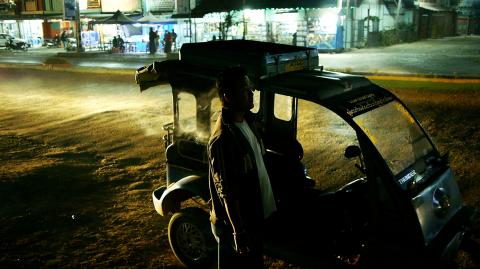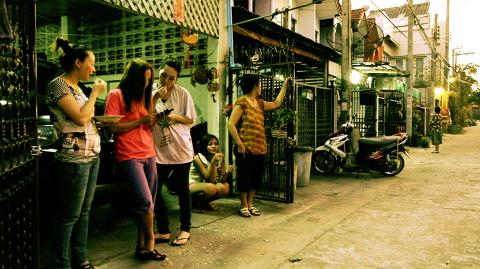In a cinematic era of computer-generated imagery and digital rendering, Midi Z’s films (趙德胤) feel like they are from another era. Framed in long takes, underemployed young men hang around and compare their meager salaries, or prate about their planned escapes to neighboring countries. Families eat meals by candlelight in shacks without electricity, and a woman perpetually awaits a promised fake ID card in a border village populated by refugees.
Midi Z’s gritty cinema offers poignant insights into Myanmar, a once-isolated country that continues to be ruled by a military junta. The 31-year-old director is an ethnic Chinese born and raised in Myanmar, who recently became a Taiwanese citizen. After years of exile in Taiwan, Midi Z returned to Myanmar at the height of its 2010 democratic elections to make his feature debut Return to Burma (歸來的人). The next year, he followed it up with Poor Folk (窮人。榴槤。麻藥。偷渡客).
These two feature films have garnered acclaim on the international film circuit for their unique portrayal of realities that had been largely unknown to the rest of the world.

photo courtesy of Flash Forward Entertainment
Diaspora and displacement are the recurrent themes in Midi Z’s works. The semi-autobiographical Return to Burma focuses on a young Burmese man called Xing-hong, who is played by the director’s childhood neighbor Wang Shin-hong (王興洪).
The Burmese Xing-hong returns home after a decade of working in Taipei, carrying with him the ashes of a fellow villager who fell to his death on the construction site where they had worked together. Through Midi Z’s sober lens, life in Myanmar is stagnant and impoverished. Money is the most talked-about topic among the deprived villagers as Xing-hong looks for job opportunities. Meanwhile, despite the country’s first democratic elections, youngsters including Xing-hong’s little brother continue to leave in search of a better life.
The sense of uprooting and alienation is heightened in Poor Folk, a story of Chinese Burmese emigrants and refugees in Thailand. After arriving in Bangkok, A-hong (Wang) is taken in by his countryman and small-time hustler A-fu — played by the director’s older brother Zhao De-fu (趙德富) — whose legitimate job is to run bus tours of Chinese visitors through Thailand. Desperately needing money to buy back his sister who was sold to traffickers, A-hong follows his compatriot to northern Thailand’s remote border town of Dagudi, where Burmese go to seek fortunes in drug and human trafficking. The plot is leavened by some deadpan humor, as the bumbling duo tries to sell the raw material from which amphetamine is made to the kingpins who rule the village.

photo courtesy of Flash Forward Entertainment
Later, the partners-in-crime cross paths with Sun-mei — played by Taiwan’s stage actress Wu Ke-xi (吳可熙) — a young Chinese-Burmese woman who works at a Bangkok brothel and smuggles young girls from Myamar to Thailand in her spare time. Sun-mei arrives in Dagudi to pick up a girl, who turns out to be A-hong’s teenaged sister.
Shot by a small crew with a consumer-grade digital camera, Midi Z’s works have a limited range and a raw feel. Though the production quality is merely passable, this honest way of filmmaking suits its subjects well and tenderly draws attention to the details of life in rural Myanmar, where villagers talk at length about their livelihoods and how much it costs to buy the passports of different countries. Political turmoil and social upheaval that make headlines in the capital are revealed only through the upbeat pop songs about democracy that Midi Z’s character hears as he travels across the country to reach home. The cast, mostly non-professionals who are the director’s friends and family, also helps the films to retain a sense of verisimilitude.
Yet Midi Z shows that he is not a filmmaker tied to the doctrine of realism. Toward the end of Poor Folk, Sun-mei and her friend pass a crashed aircraft on a vast, empty plain in the border village. In the otherwise hyper-realistic film, the digitally rendered plane is a curious commentary on the act of crossing borders. It’s this just-right blend of vision and cinematic sensibilities that make Midi Z a promising talent and a name to watch closely.

photo courtesy of Flash Forward Entertainment
Return to Burma and Poor Folk are playing at SPOT — Taipei Film House (台北光點), 18, Zhongshan N Rd Sec 2, Taipei City (台北市中山北路二段18號) until May 17. Both films have subtitles in Chinese and English.

In recent weeks the Trump Administration has been demanding that Taiwan transfer half of its chip manufacturing to the US. In an interview with NewsNation, US Secretary of Commerce Howard Lutnick said that the US would need 50 percent of domestic chip production to protect Taiwan. He stated, discussing Taiwan’s chip production: “My argument to them was, well, if you have 95 percent, how am I gonna get it to protect you? You’re going to put it on a plane? You’re going to put it on a boat?” The stench of the Trump Administration’s mafia-style notions of “protection” was strong

Every now and then, it’s nice to just point somewhere on a map and head out with no plan. In Taiwan, where convenience reigns, food options are plentiful and people are generally friendly and helpful, this type of trip is that much easier to pull off. One day last November, a spur-of-the-moment day hike in the hills of Chiayi County turned into a surprisingly memorable experience that impressed on me once again how fortunate we all are to call this island home. The scenery I walked through that day — a mix of forest and farms reaching up into the clouds

With one week left until election day, the drama is high in the race for the Chinese Nationalist Party (KMT) chair. The race is still potentially wide open between the three frontrunners. The most accurate poll is done by Apollo Survey & Research Co (艾普羅民調公司), which was conducted a week and a half ago with two-thirds of the respondents party members, who are the only ones eligible to vote. For details on the candidates, check the Oct. 4 edition of this column, “A look at the KMT chair candidates” on page 12. The popular frontrunner was 56-year-old Cheng Li-wun (鄭麗文)

Oct. 13 to Oct. 19 When ordered to resign from her teaching position in June 1928 due to her husband’s anti-colonial activities, Lin Shih-hao (林氏好) refused to back down. The next day, she still showed up at Tainan Second Preschool, where she was warned that she would be fired if she didn’t comply. Lin continued to ignore the orders and was eventually let go without severance — even losing her pay for that month. Rather than despairing, she found a non-government job and even joined her husband Lu Ping-ting’s (盧丙丁) non-violent resistance and labor rights movements. When the government’s 1931 crackdown